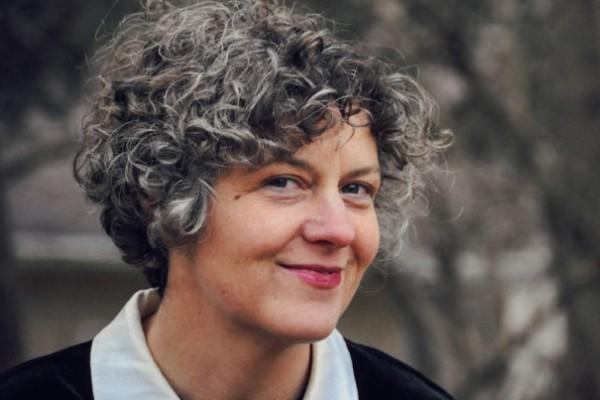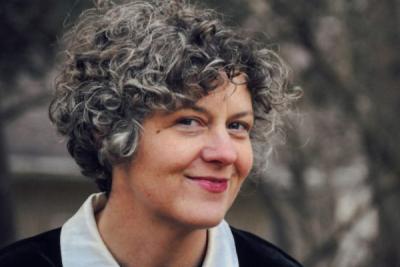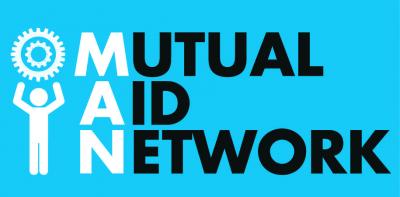
An Interview with Stephanie Rearick
 cross-posted from Commons Transition
cross-posted from Commons Transition
As part of [the Commons Transition] series on the 100 Women Who Are Co-Creating the P2P Society, Michel Bauwens interviews Stephanie Rearick of the Mutual Aid Network.
Stephanie Rearick and her friends and co-workers have been constructing a solidarity-based economic network in Madison, Wisconsin and beyond:
Can you tell us a bit about your background and what brought you to your current political and social engagement?
I was fairly apolitical growing up, until I volunteered for Amnesty International on a US death penalty case at age 18, then decided to go for it and worked for Greenpeace for 6 of my most formative years (age 20-26). Then I became a co-owner of a small local business (Mother Fool’s Coffeehouse) and an independent musician. I stayed active in social justice issues, focusing on the over-incarceration and racial disparities thereof in my community. I worked a lot of drug policy, believing (still do) that the War on Drugs is the single biggest driver of selective enforcement of laws and, consequently, racial disparities.
In the course of all this work it became painfully apparent that our economy was an active enemy of everything I cared about. There would be no way to have a meaningful impact on any of the systems I was pushing on without a fundamental change in our economy.I became very preoccupied with this ‘missing link’ feeling in 2004 and decided to read a book that had actually been on my shelf for many years – The Future of Money by Bernard Lietaer.
Lietaer’s analysis of the problem and possible solutions changed my worldview. I found timebanking to be the most compelling model – simple, elegant, egalitarian – and I knew I had to test it out to prove it could be as powerful as I thought it could. And I felt I had no choice but to get one going as quickly as possible, and to try out all the things it appeared to me it would be able to do. So I founded the Dane County TimeBank in 2005, and have been at it ever since.
I’ve come to see timebanking as a way we can decide what we’d like to do in our communities, then ‘hire’ our friends and neighbors to help us, all by freely exchanging our time and talents with one another.
But my desire has always been to work at a bigger picture level, to connect more sectors of economic, community, and creative life than timebanking can do on its own. And I have now begun to move more into that realm, developing Mutual Aid Networks in an effort to create the legal, social, and financial framework to redesign how we approach work and compensation.
It’s reminding me of a powerful curiosity I developed when I was reading Das Kapital (Marx) for a class my first year of college. I really wanted to find out whether, if everyone did exactly what they wanted to do, would all the necessary work get done? And I guessed, yes it would, and lots of beautiful ‘unnecessary’ work too, and probably with much greater quality and care. And now I hope MANs help us test that out!
What can you tell us about Madison itself and its contradictions?
Madison is a beautiful small-ish (300,000ish) city on an Isthmus. It has a longstanding tradition of progressivism and human-scaled livability. Our city planners were very deliberate in choosing a route toward education and recreation instead of industry. We’re the State Capitol and the hub of the University of Wisconsin system. Madison regularly makes top 10 lists for best places to live in the US.
On the other hand, Wisconsin has the highest racial disparities in incarceration in the US, with Dane County (Madison’s home) taking the lead in the state. A recent “Race to Equity” report shows that Madison continues to have a dismal ‘achievement gap’ and horrendous wealth inequality along racial lines, and a new report by the Annie Casey Foundation finds Wisconsin dead last as the worst place in the nation to raise black children. What is the aim of the Mutual Aid Network, how did you go about creating this project, what is the situation today and what do you see as the next steps?
What is the aim of the Mutual Aid Network, how did you go about creating this project, what is the situation today and what do you see as the next steps?
The aim of Mutual Aid Networks is to redesign work. To apply what we know about economic and community building tools to creating a new vision for work – instead of getting jobs so we can afford to live, we decide how we want to live and create community supports for each other to do what we want to do. The aim is kinda to turn everyone into freelancers, entrepreneurs, homemakers, artists, any combination thereof, with some material security because we choose to provide that to each other. Many of the resources that we need to access through sharing or exchange are available from people in our local communities. So why not agree to exchange everything but money whenever we can, and save our money for the things we really can’t get from people we know? Why not pool our money so when big expenses arise, each of us can access as much as we need without having had to stockpile a huge amount individually? Why not connect all these various tools and processes that people have been using individually, often with significant success, for generations? We believe that simply connecting various processes and people into a functioning ecosystem will increase the power of these systems exponentially.
I, along with a large rotating cast of wonderful collaborators, went about creating MANs by embarking on a very deliberate learning journey, inviting people along to help out in any way possible. We started in 2010 at the behest of our most generous funder, who had been supporting the Dane County TimeBank and wanted to see it become self-sustaining.
The learning journey included participation in many conferences, producing and presenting papers with an academic partner, and then creating and delivering a monthly work-and-learn series called Builders Workshops. During the series (still ongoing) we identified strengths and limitations of various complementary currency and resource sharing models, including timebanking, gift economies, price-based mutual credit, cooperative savings pools, and cooperative ownership. We came to the conclusion that the limitations of each could be filled by the strengths of others. We decided to create a model and process to test this. And we realized that economies are at root social processes and constructs.. So we’re focusing on creating a community, a culture, that will embrace risk and innovation and sharing in service of building a real solidarity economy that works for the 100%.
Are you connected with any broader social movements that is bigger than the local importance of the M.A.N. project?
First, we have MAN pilot sites lined up in 16 locations, mostly around the US (including Detroit and St. Louis) but also in UK, Sweden, and France. With interest in Zambia and other farther-flung locations. We are connected to timebanks, transition towns, permaculture practitioners, restorative justice activists, health and wellness projects, and solidarity economy activists. I’m personally most excited by our collaborations with activists against police brutality and the prison industrial complex. All of these connections will begin to become very visible as pilot sites and our project sharing software come online, starting late in August.
Do the concepts of p2p, the commons, the sharing economy mean anything specific in your work?
P2P, the commons, and the sharing economy are all core in our work and have been explicit goals for us. But by “sharing economy” I mean genuine sharing, not selling things to each other through for-profit intermediaries. I see the economy we’re building as a real p2p economy, with people providing both the work and the security to one another. I see MANs filling an explicit need to build an economic engine that feeds the commons rather than eating it (the latter concept I gained from Charles Eisenstein’s Sacred Economics). As for the sharing economy, we aren’t really using the phrase much since its cooptation but we really are working to build the real one.
Where do you want Madison, and the wider world, to be in say 2025-2030?
I want Madison to be seen as a birthplace of the network that is connecting every person on the planet, indirectly, to every other person on the planet, in an explicit agreement to support each other’s right to their best possible life. Is that so much to ask???
But this is true, even if it seems a bit ambitious. I want 2015 to be remembered as the turning point, the ‘dark before the dawn’ time when we realize our current system is lashing out so viciously precisely because it is about to die.”
Go to the GEO front page
Do the concepts of p2p, the commons, the sharing economy mean anything specific in your work ?
P2P, the commons, and the sharing economy are all core in our work and have been explicit goals for us. But by “sharing economy” I mean genuine sharing, not selling things to each other through for-profit intermediaries. I see the economy we’re building as a real p2p economy, with people providing both the work and the security to one another. I see MANs filling an explicit need to build an economic engine that feeds the commons rather than eating it (the latter concept I gained from Charles Eisenstein’s Sacred Economics). As for the sharing economy, we aren’t really using the phrase much since its cooptation but we really are working to build the real one.
Where do you want Madison, and the wider world, to be in say 2025-2030 ?
I want Madison to be seen as a birthplace of the network that is connecting every person on the planet, indirectly, to every other person on the planet, in an explicit agreement to support each other’s right to their best possible life. Is that so much to ask???
But this is true, even if it seems a bit ambitious. I want 2015 to be remembered as the turning point, the ‘dark before the dawn’ time when we realize our current system is lashing out so viciously precisely because it is about to die.”
Anything else you want to add ?
The only other information I want to convey is about MAN Up Summit August 20-28, and our web summit happening now. Information on all of it at http://mutualaidnetwork.org
- See more at: http://commonstransition.org/stephanie-rearick-on-mutual-aid-networks-and-local-solidarity/#sthash.87IsONP9.dpufAs part of our series on the 100 Women Who Are Co-Creating the P2P Society, Michel Bauwens interviews Stephanie Rearick of the Mutual Aid Network.
- See more at: http://commonstransition.org/stephanie-rearick-on-mutual-aid-networks-and-local-solidarity/#sthash.87IsONP9.dpuf
Add new comment